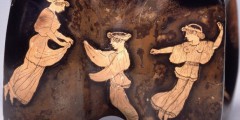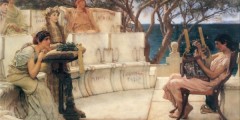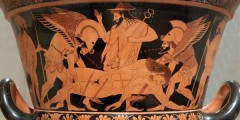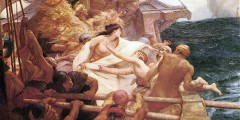(Ancient) Advice Column 1: The Football Fan
February 28, 2014
Esther Eidinow begins a new advice column: what should you do if your team has offended the gods? The subject line read ‘Question About Removing a Curse’. I teach a module on Ancient Greek magic and religion—but the sender was not one of my students. If this was a phishing attempt, it was novel. I …
Aristophanes in London
February 19, 2014
Last week saw the students of both UCL and KCL put on their annual Classical plays. That gave Oliver Thomas the opportunity to see two of Aristophanes’ comedies on the same day – UCL’s Clouds, performed in translation, and KCL’s Wasps, performed in Greek with English surtitles. Two productions of early Aristophanes plays, but two …
New Sappho: not for Valentine’s Day!
February 12, 2014
So: new Sappho! Actually, there are two new Sappho papyri coming up; the one we know about has two fragments, but the most comprehensible is the one which its editor, Dirk Obbink, has called the ‘Brothers poem’, and that’s what I’ll talk about here. The best place to read about it, to see a (tidied …
Sarpedon: Looking at the Past
January 23, 2014
The pot in the picture is a big (about 45 cm tall) krater (mixing bowl for wine), manufactured in Athens in the late sixth century BC. We know the name of the potter (Euxitheos) and the painter (Euphronios), because both are named on the pot (one signature reads ‘Euxitheos made me’ and another ‘Euphronios painted …
They might be Argonauts
December 19, 2013
One of the great things about working on Classics, and especially Classical Reception, is the enormous variety of material with which you can work. My current major research project is a history of the myth of Jason and the Argonauts. Thinking about how passing references to the Argonauts form the way we think about them, …





